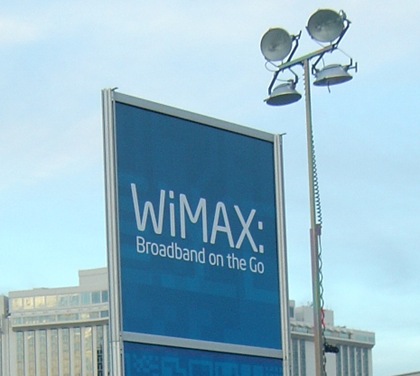
The folks over at Unstrung got confirmation from Sprint VP Atish Gude that one of the payment options for the upcoming US WiMAX network will be day passes. (via Broadband Reports) In other words, if you don’t want to sign a contract, you can pay for a day of use just like with a Wi-Fi hotspot.
I’ve written before that the per-use mobile broadband model would be my ideal. I don’t need mobile access often, but when I do, it’s critical, and I’m willing to pay. That said, I had an interesting conversation on this topic with Arnie Berman, chief technology strategist at Cowen and Co., and he makes a good argument that the “by-the-drink” model has serious flaws.
Broadly speaking, as Arnie says, all-you-can-eat pricing drives adoption by bringing predictability to monthly billing levels. Fine. WiMAX isn’t doing away with that model as its main option. However, the big question is whether wireless carriers can maintain flat-fee day-pass payments (predictable per-use fees) or whether they’ll start charging by bandwidth used. Since bandwidth caps are now a serious part of the conversation in fixed broadband, why shouldn’t we expect the same to happen on the mobile side? And if that happens, how can we gauge our own usage and avoid unpleasant billing surprises?
Over on GigaOM last week, Arnie talked about this very dilemma with regard to cloud computing. He argued there that we need more than a usage monitoring tool; we need a tool that forecasts likely usage. Maybe the same is true for mobile broadband. I’m all for WiMAX day passes, but if service providers end up charging by the byte, I want a simple way to determine what payment plan makes the most sense for me. And more importantly, whether I can afford mobile broadband at all.
Mari: I agree that pay-as-you-go mobile broadband would be very attractive for travelers, but the catch is going to be the hardware cost. Any recent laptop has built-in WiFi, and most hotels and specialty coffee places have free or low-cost WiFi. I doubt that many will spend $200-300 for WiMax hardware, just for the opportunity to pay $5-10 per day for mobile broadband.
Not yet sure exactly how much the WiMax cards will be but I expect less than $300. DigitalBridges are bundling their PC card with a $40 a month contract.
Dan Jones
Unstrung.com
Much less than $300. Plus, WiMAX will come embedded in mobile devices and eventually in laptops.
Dan: Of course the card will be virtually free with a contract! Mari’s post involves no-contract pay-as-you-go WiMax. I don’t expect that the hardware will be subsidized for pay-as-you-go service. Until the hardware gets below $50, I doubt that pay-as-you-go will catch on.